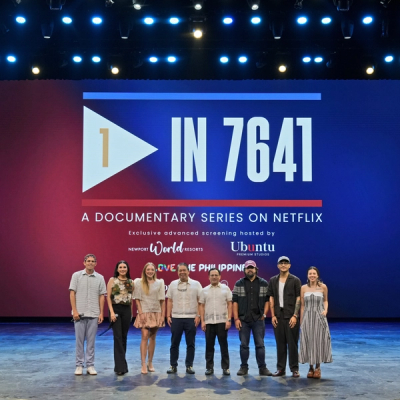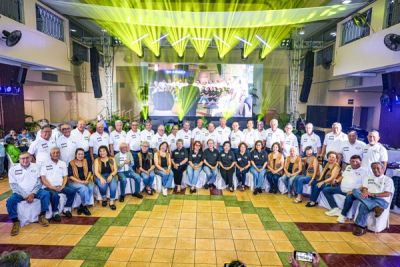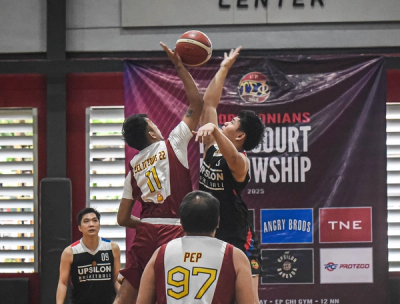Alumni
ULAP: Helping Fellows while Empowering the Forgotten
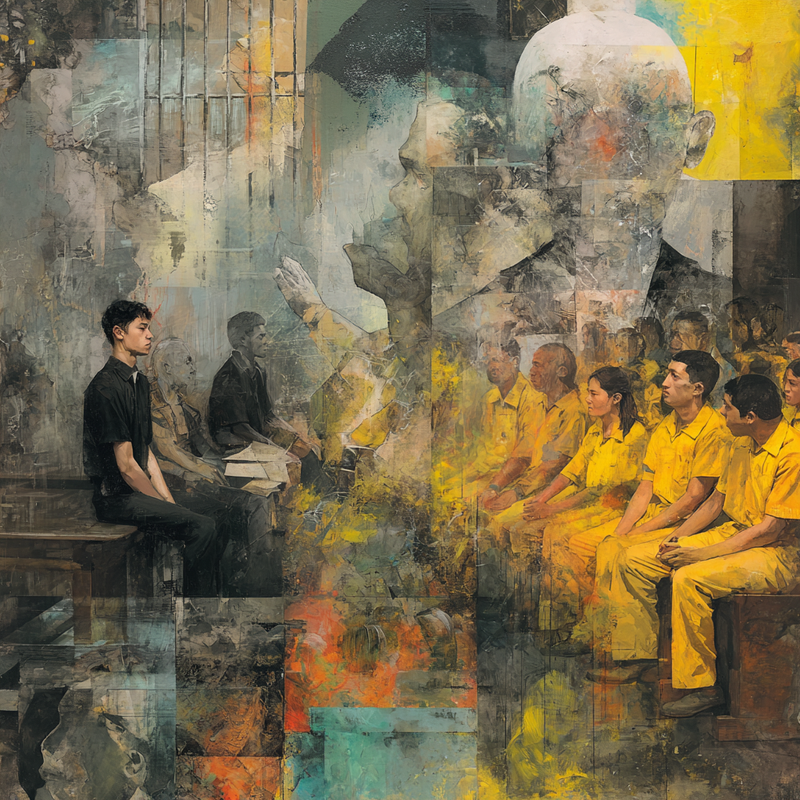
On the morning of September 29, 2025, inside the BJMP Municipal Jail in Los Baños, Laguna, a roomful of detainees sat quietly, listening to two young lawyers, Dino Adeva 2023 and Wesley Young 2023, along with myself, talk about the law in plain Tagalog, in words they understood. The persons deprived of liberty (PDLs), all wearing yellow shirts, most of whom were still awaiting trial, nodded, took notes, and raised their hands to ask questions. One wondered about Good Conduct Time Allowance, another about plea bargaining, and a third wanted to know what “speedy trial” really meant in practice.
It was a small crowd, with no fanfare and no big-name politicians. But for the Upsilon Sigma Phi Alumni Association, Inc. (USPAA), it marked a milestone. This was the first public mission of the Upsilon Legal Assistance Program (ULAP), and the first time the Fraternity’s legal aid initiative stepped beyond theory, and into a space where help was urgently needed.

A Program with Legal Teeth
ULAP was formally launched on June 27, 2025, during the Midyear Fellowship of the USPAA. It was conceived by current USPAA Chairman Eric Pilapil ’86 as a complementary initiative to the Upsilon Medical Assistance Program (UMAP), which had been launched during the term of his batchmate, Ed Sunico ’86. Modeled after UMAP, ULAP’s aim was straightforward: to provide organized, timely legal support to fellows in distress, and, in time, to the broader communities they serve.
But unlike one-off initiatives or informal favors, ULAP was designed as a structure, with defined roles, a working triage system, and alignment with national legal aid policy. Fellows have long helped one another with legal concerns as needed. ULAP formalizes that practice by creating an organized and consistent system for delivering legal support.
At its core, ULAP operates through a legal triage system. Fellows in need may contact me, designated as the program’s founding Chairman and current Triage Officer, via text, Viber, or email. Requests are discreetly posted within a secure network of lawyer-brods and referred to the most suitable volunteer. Urgent cases are escalated to the Quick Response Force (QRF), a rotating team of lawyers assigned to handle time-sensitive matters. Once assigned, the Triage Officer logs each engagement by number only, protecting privacy while maintaining system accountability.
Since its launch, ULAP has responded to a range of concerns, including vehicle accidents, questions about UP College of Law admission requirements, financial transactions, and family law matters such as the preparation of affidavits of “One and the Same Person.” Some of these issues have occurred more than once, reflecting common areas where fellows often seek legal support.
This triage model has both a pull system (when a brod reaches out for help) and a push system (when the Fraternity anticipates a legal need in a crisis, and deploys preemptively). It is lean by design, and reliant on volunteers, but it works because behind it is a growing pool of lawyer-brods committed to the mission.
For now, ULAP limits eligibility to fellows, their immediate families, and their personal businesses. Covered services include legal advice, document preparation (including notarial services), and representation. The program does not cover bail, bonds, filing fees, or similar costs, as specified in its guidelines.
Compliant by Design
ULAP was designed to align with the Supreme Court’s Unified Legal Aid Service (ULAS) under A.M. No. 22-11-01-SC, which requires covered lawyers to render a minimum number of legal aid hours. The program allows participating Upsilonian lawyers to earn ULAS-creditable hours by joining accredited ULAP legal aid activities. These activities are planned in coordination with partner agencies and are subject to accreditation by the ULAS Board as provided in the program’s guidelines
ULAP commits to organizing at least two legal aid activities per year during the term of the incumbent USPAAI trustees, or a total of four per full term. These activities are planned in coordination with relevant agencies and are subject to accreditation by the ULAS Board. Participating lawyers may earn ULAS-creditable hours, which are tracked and reported by the ULAP Steering Committee in accordance with the Supreme Court’s Unified Legal Aid Service (ULAS) rules.
The ULAP Steering Committee is chaired by me, with members Juan Victor Valdez 1988, John Patrick Ingles 1997, and Eric Pasion 2004. The committee is tasked with planning legal aid activities and securing ULAS accreditation in coordination with relevant government agencies such as the DOJ, BI, BJMP, and DILG, as provided in the program guidelines.
Prior to the June 27, 2025 Midyear Fellowship, the USPAAI Legal Committee announced to the Upsilon Practitioners Group that it was formalizing a triage system for legal work referrals among fellows. Practicing lawyers were asked to update their entries in the Upsilon directory. ULAS-covered lawyer-brods, including lawyers from their firms, were also invited to participate in planned legal aid missions and related activities for ULAS compliance. Fellows serving in government or community leadership roles were encouraged to coordinate with ULAP in hosting legal aid missions in their constituencies.
One Mission in a Bigger War to Help
The Los Baños mission, organized by the USP Los Baños Residents and led by Niki Marasigan 2023, was the first field test.
Held in coordination with the BJMP, the event focused on one of the most underserved and misunderstood sectors in the justice system: PDLs, or Persons Deprived of Liberty. Many are not convicted. They are simply awaiting judgment, often without legal counsel, and often without even knowing their options.
One man learned he had already served the minimum time required to plead out his case. Another realized his prolonged detention without arraignment could be challenged. Several asked how to apply their learnings retroactively. This was the kind of legal empowerment that changes lives—not in the distant future, but now.
Behind the scenes, alumni like Peter Suchianco ’83, Chester Abugan ’96, Nelson Manglo 2000, and Jonathan Suy 2023 helped fund logistics and supplies. The residents handled ground coordination, from security clearances to seating arrangements. Warden Charles Kenneth Maquera, who hosted the mission, later presented certificates of appreciation to ULAP and the Upsilon Sigma Phi.
The open forum showed the clearest impact of the program: the detainees did not just listen but asked questions, connected the discussion to their own cases, and took the law seriously because someone had taken the time to explain it.
A Working Model
ULAP remains in its early stages, with recruitment ongoing and processes still being refined. The Los Baños mission demonstrated that legal aid does not need to be large or elaborate; it only needs to be accessible and properly delivered.
The activity confirmed that the Fraternity has the internal capacity—skills, structure, and willingness—to respond to legal needs that are often overlooked. For a first effort, it was modest but sufficient to prove that the system works.
Beyond Brotherhood
The legal profession and fraternity life are both governed by rules, but ULAP works because it applies those rules to real situations that require attention.
It is not just a support system for fellows but also a mechanism for delivering legal assistance to those without access. That was the purpose of the Los Baños mission, and that is what ULAP accomplished.
For legal assistance or to volunteer for ULAP:
Email: upsilonlegalassistance@gmail.com
Mobile Phone: 0917 802 2417 (Viber/SMS)
Triage handled within 24–48 hours
About the Author
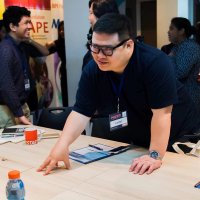
Lester Nazarene V. Ople 2001
Lester 2001 graduated from UP Los Banos with a degree in BS Agricultural Economics and was a full-time working student when he completed his Juris Doctor from Arellano University School of Law in 2016. He is a practicing lawyer based in Makati City and is a member of the faculty in Arellano University School of Law and the University of Asia & the Pacific. Aside from his academic work, he serves as adviser to both universities' bar operations commissions. His legal work focuses on labor law and human resources management, corporate governance, and energy law as a consumer advocate. Aside from his professional pursuits, he is a kendoka affiliated with the Makati Kendo Club. He has served the Upsilon Sigma Phi Los Banos Alumni Association for three (3) terms prior to joining the USPAA.
